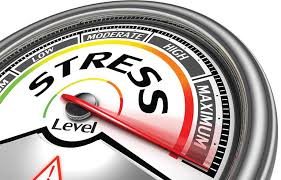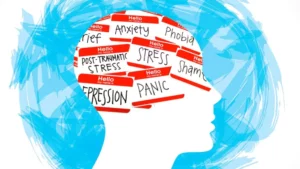Contents
- 1 How To Handle An Employee Off With Work-Related Stress?
- 2 What Is Work-related Stress?
- 3 How To Handle An Employee Off With Work-related Stress?
- 4 Causes Of Work-related Stress
- 5 How Employers Can Help Reduce Stress?
- 6 What Can Employees Do Reduce Work-related Stress?
- 7 What To Do When An Employee Is Off Work Due To Stress?
- 8 How To Monitor Stress Level At Workplace?
- 9 A word from Mantra Care
How To Handle An Employee Off With Work-Related Stress?

The benefits from having a workplace that also functions like a family. When employees feel like they’re cared for and are a part of a community, it relieves stress and increases happiness. And a happy employee is a productive employee. This is a great business opportunity because it allows you to reach out to unhappy employees. And with your help can turn their workplace into a happier one. An employee off with work-related stress should feel supported by employers and colleagues.
It’s important for employers to focus on the health of their employees when it comes to stress, both in and outside of work. Stress affects all kinds of people from any walk of life. But when it begins affecting your work, it becomes a problem. Symptoms such as increased irritability or sadness are often easy enough to ignore at home. But when they manifest themselves at work the consequences can be dire. If stress is left untreated, personal relationships with co-workers can become prickly and easily set off which leads them further down a path towards an unhappy life. In extreme cases, depression can set in. But thankfully this is something that company policy should cover.
Work-related stress is a physical and mental health problem that is often caused by work pressures. It involves bodily distress, anxiety, or depression in response to a dose of work stressor. The frequency and severity of the distress vary from person to person. Work-related stress can affect an employee’s productivity and lead to health problems. These different types of illnesses include heart disease, obesity, diabetes, mental illness, headache, lower back pain, and others.
Work-related stress is caused by a variety of factors. Stress occurs when an individual experiences a psychological or physical demand that strains or exceeds their coping abilities. The work environment can cause stress, such as heavy workloads, time pressure, and deadlines, working long hours, and having to meet certain job requirements while striving for promotion. It also includes interpersonal conflicts with managers, co-workers, and customers.

Below are some suggestions on how to handle an employee off with work-related stress-
» Institute a wellness program that includes healthy eating, exercise, and relaxation techniques. Provide them access to yoga classes for health benefits so they can have more time to focus on themselves rather than their career path.
» Increase the supportive atmosphere by having good communication and listening to them and their issues. You can start this by sending an open-ended questionnaire that will give the employees a chance to be heard and express themselves.
» Start having employee-friendly practices such as flexible work arrangements, telecommuting and job sharing, paid parental leave for time off during the months before and after the birth or adoption of a child.
» Create a diverse workforce with people from different backgrounds in order to managing stress levels in the workplace. This allows diversity which decreases racism and sexism while exposing one another’s views.
» Have performance management programs that encourage responsibility rather than punishing bad behavior because it helps employees understand what they did wrong instead of being too harsh on them because eventually, their mental health will deteriorate which you obviously want to avoid
» Provide a healthy work environment so you can avoid any health risks in the future. Implementing workplace ergonomics and along training to use the required equipment safely will benefit your employees
» Keep track of all your reports in order to see which ones have been less productive in terms of dealing with their problems instead of taking time off because it will expose who you should keep an eye on in order for them to get back into work without any burdensome problems.
Stress is a natural response to pressures, but when stress levels go beyond what a person can cope with, it becomes a problem. Work-related stress is a physical and mental health problem that is often caused by work pressures. The frequency and severity of the distress vary from person to person. Work-related stress can lead to different types of illnesses, including heart disease, obesity, diabetes, mental illness, headache, back pain, and others. Work-related stress is caused by many factors such as heavy workloads, time pressure, and deadlines, working long hours, and having to meet certain job requirements while striving for promotion. It also includes interpersonal conflicts with managers, co-workers, and customers. To help alleviate the symptoms of work-related stress, below are some of the most effective coping strategies. Causes of work-related stress:
Heavy Workloads

Employees facing heavy workloads often have a high rate of work-related stress, as individuals who have more on their plates tend to experience more tension and anxiety.
Time Pressure
If shift workers or hourly employees have time constraints on their tasks, they will often feel pressured and this can lead to higher levels of stress.
Meeting deadlines is an essential part of a job. But if these due dates are constantly being pushed back then it may result in a significant amount of added pressure.
Job Requirements/Standards
Job requirements aren’t always negotiable. For instance, a manager is told that they have to carry out a certain task and how it must be done. If there is constant criticism for not meeting the set standards, employees may feel stressed.
Promotions/Career Advancement
Employees can feel pressure connected with promotions or career advancement. When they feel that their job performance isn’t meeting expectations, this may become overwhelming.
Workplace Bullying
Workplace bullying is an act of repeated harmful behavior towards an employee by another individual. The ones who have control over them or who act on behalf of someone who does. Racism in the workplace may trigger stress.
Long Work Hours
Working long hours will often lead to more stress than usual. Because people are unable to relax outside of work. For instance, individuals working nine-to-five may be able to take a break and de-stress, whereas those who work overtime have no time for themselves. Because they are constantly working.
Overtime
Working overtime regularly can often lead to stress as it can interfere with home-life and cause employees to become overworked. For example, individuals who work long hours in a shift pattern may start sleeping during the day. It will interfere with their sleep patterns at night leading to low energy levels.
Mental Health Problems
Employees who have pre-existing mental health conditions or illnesses such as depression or anxiety may find that their job brings about additional pressures which could trigger feelings of stress. In contrast, some people feel more relaxed because their current employment allows them to deal with issues they were struggling with at home.
Individuals with pre-existing mental health conditions may find that their job brings about additional pressures which could trigger feelings of stress. For instance, if an individual had issues with maintaining friendships or relationships in the past. This type of employment may give them a sense of satisfaction and accomplishment. Work-related stress can cause individuals to experience mental illnesses such as depression or anxiety.
Parenting Roles
If an employee feels unable to balance work responsibilities with parenting roles, they are likely to become stressed. Parents who feel judged for not being able to successfully manage both are often what causes high levels of work-related stress.
Co-workers
If employees are not liked by their co-workers, the toxicity of the environment will cause them to experience work-related stress. People who get along with their colleagues tend to be less stressed than those who do not.
Unfavorable Working Conditions
Employees who need extra equipment or resources in order to complete tasks may become frustrated if it is unavailable which can result in higher levels of stress. Employees do not have the power to make big decisions at work which can lead to stress.
Personal Life Interference
 Work-related stress can interfere with personal life, causing mental health problems at home and the inability to relax outside of work. The following tip should help individuals to manage work-related stress. That is taking regular breaks throughout the day. Many people feel guilty when they take a break because they worry that it may affect the outcome of their tasks. However, this is not truly taking a break that allows individuals to de-stress. And become more productive when they return to work.
Work-related stress can interfere with personal life, causing mental health problems at home and the inability to relax outside of work. The following tip should help individuals to manage work-related stress. That is taking regular breaks throughout the day. Many people feel guilty when they take a break because they worry that it may affect the outcome of their tasks. However, this is not truly taking a break that allows individuals to de-stress. And become more productive when they return to work.
How Employers Can Help Reduce Stress?
It’s important to take care of all your employees equally when it comes to stress. It might be easier to ignore the problems of an introvert than an extrovert because they don’t shout their issues from the rooftop for everyone around them to hear, but it’s still important not to overlook anyone. If nothing else, employers should offer regular meetings where they can talk about what’s on their minds and receive help in making their work relationships more rewarding.
Establish A Good Workplace Culture
 Employers also need to look at workplace culture when it comes to stress. A lot of people turn up every morning dreading what they’re supposed to do that day because they think if they don’t do it that way, they’ll get into trouble. Sometimes just by making small changes to the norm, employees can feel more involved and in turn, less stressed. By offering different projects for them to take part in or even by allowing individual employees to suggest ways of improving company policy, you can make your entire workforce happier without lifting a finger.
Employers also need to look at workplace culture when it comes to stress. A lot of people turn up every morning dreading what they’re supposed to do that day because they think if they don’t do it that way, they’ll get into trouble. Sometimes just by making small changes to the norm, employees can feel more involved and in turn, less stressed. By offering different projects for them to take part in or even by allowing individual employees to suggest ways of improving company policy, you can make your entire workforce happier without lifting a finger.
Consider Their Outside Work Stress
Touching base with staff outside of the office is also important when it comes to stress. It’s easy enough for employees to ignore their problems when they’re stuck at work all day but what about after hours. There are many reasons why people might be feeling under pressure. It could be financial problems at home or health concerns that need attention. If you aren’t careful, this kind of stress can lead to bigger problems. It’s important that the company comes together to help address these issues rather than ignoring them entirely, even if it means working on a Saturday afternoon.
Allow Some Time Off-Work
 Finally, allowing staff some time off is essential when there are concerns about stress. Everyone needs to recharge their batteries once in a while and sometimes an enforced holiday is necessary to combat personal struggles. If you know your employees are under pressure but they won’t take time out of work without being told, this might be the only option available left to you short of firing them or letting them go completely. By taking steps like these, employers can avoid serious personal catastrophes that would affect productivity within the workplace as well as outside of it. A happy employee is one who performs well throughout the day, but also one who leaves work at the end of it feeling satisfied with what they’ve done.
Finally, allowing staff some time off is essential when there are concerns about stress. Everyone needs to recharge their batteries once in a while and sometimes an enforced holiday is necessary to combat personal struggles. If you know your employees are under pressure but they won’t take time out of work without being told, this might be the only option available left to you short of firing them or letting them go completely. By taking steps like these, employers can avoid serious personal catastrophes that would affect productivity within the workplace as well as outside of it. A happy employee is one who performs well throughout the day, but also one who leaves work at the end of it feeling satisfied with what they’ve done.
Employees are not your employees; they are human beings. Every human being does make mistakes, but that doesn’t mean you should punish them by taking away some of their freedom to do their job right. Allowing more freedom within the workplace actually makes employees more productive and happier about themselves, which is great for business. It’s easy to blame someone else when something goes wrong rather than owning up to our own mistakes but employers need to be brave enough to do so instead of looking for scapegoats all the time. When everyone works together with both in-person and online, there’s more chance of solving problems faster without being so stressed about everything that’s going on.
Pursuing hobbies, having interests outside of work can take your mind off things which makes you feel less stressed. ‘If an employee feels unable to balance work responsibilities with parenting roles, they are likely to become stressed’.
Having a good relationship with colleagues and employers. If employees do not get along or communicate well with others, stress levels will be higher than normal. Having positive thinking people who believe in themselves and maintain strong self-beliefs tend to experience lower levels of stress than those who lack confidence in themselves.
Being Able To Deal With Change
Being able to adapt to change is beneficial because it means employees are able to handle new tasks while becoming less stressed at work. Employees who have the ability to make decisions will experience lower levels of stress than those who do not. For instance, if an employee feels that they are in control of the tasks they perform, like deciding which projects take priority. Their stress levels will be significantly reduced.
Staying Healthy
 Regular exercise can reduce stress. However, it has been suggested that exercising before starting the working day is better. Because this strategy lets employees feel energized throughout their shift Working hard and doing good quality work should present positive outcomes which make employees less stressed.
Regular exercise can reduce stress. However, it has been suggested that exercising before starting the working day is better. Because this strategy lets employees feel energized throughout their shift Working hard and doing good quality work should present positive outcomes which make employees less stressed.
Having A Good Work-life Balance
This means working sensible hours and not overdoing it. If employees feel that they cannot switch off their minds outside of work, this will cause stress levels to rise.
Being able to change jobs or roles if needed. Having the ability to transition into another job role is important. Because this gives individuals options that reduce the likelihood of them becoming stressed ‘Regular exercise can reduce stress”.
What To Do When An Employee Is Off Work Due To Stress?
There are many things that managers can do for an employee who is off work due to stress. One thing they can do is to inquire about the severity of the employee’s work-related stress. As well as what triggered it. They can also offer some form of assistance, such as working with the specialist on setting up a treatment plan or simply checking in with them on a weekly basis.
Another thing that managers can do is help the employee adjust to their stress. For instance, giving them tasks and responsibilities that can help reduce their stress levels. This could be something as simple as encouraging the employee to take on a pet project. Or ask them what they would like to see happen in order for them to feel more comfortable at their job.
Lastly, managers should also monitor the results of any changes that are made and work with specialists to ensure that there isn’t anything else that needs adjusting on behalf of the employee.
How To Monitor Stress Level At Workplace?

A supervisor needs to monitor the stress level of an employee at the workplace. A person has a higher chance of experiencing stress when they work in a dangerous or unhealthy environment. In such cases, it is important for a supervisor to engage in preventive actions. For instance, if the worker has been working on a project for a long time. And it had led to increased feelings of anxiety. It is important for a supervisor to make sure the worker is taken care of and helped out with what they need.
In case an employee experiences an injury from work that leads them to be on leave from work. The employer should monitor their progress without being intrusive. This way one can ensure that they are taking care of themselves better. If the employee is not performing well enough to take up their work. Then it is advisable that an employer assigns them some other tasks until they are able to cope with their normal workloads. It is important to be mindful of how work impacts a person. So as to ensure they have a healthy working environment at the workplace.
If you’re not taking care of your employees, they won’t take care of your business. If an employee is experiencing work-related stress. It can be hard for them to do their job well or at all. It’s important that employers monitor the workers’ progress without being invasive. And if needed give some other tasks to help ease back into a full workload as time goes on. Even if someone seems like they’re coping with everything just fine, don’t let down your guard. You can reduce the number of an employee off with work-related stress by taking care of their problems.
A word from Mantra Care
There are many signs of stress that come from working in such conditions. And it may only get worse over time without intervention. The best way we’ve found to prevent this is by providing our clients with access to self-care resources. And implementing workplace wellness programs. MantraCare provides the best employee wellness programs for workplaces.



